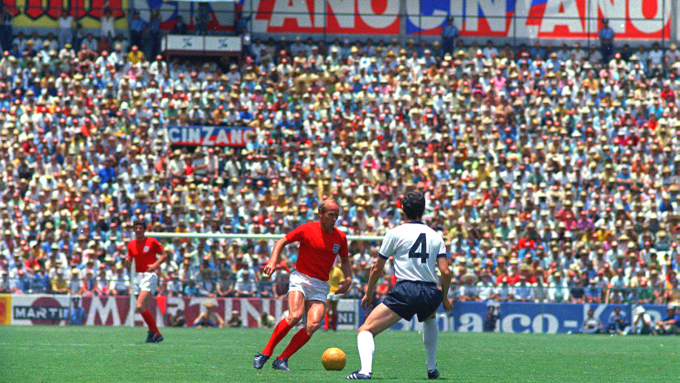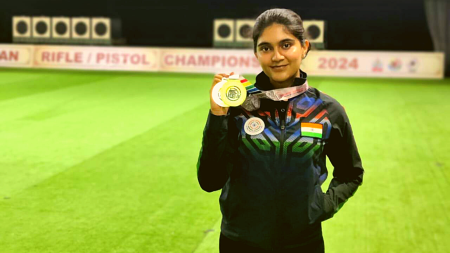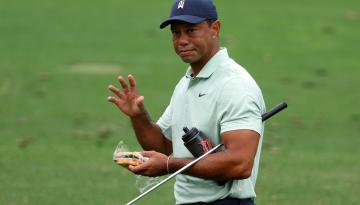Football’s all-conquering Emperor, German great Franz Beckenbauer no more
Franz Beckenbauer not just embodied the ideals of German football, its fabled tenacity and indefatigability. But he was German football itself.
One of just three men to have lifted the World Cup as both player and manager, he was arguably the greatest footballer his country has produced, the man who reinvented the role of a defender in the game. He was arguably the greatest leader on the football pitch his country has churned out, whose single-minded defiance upset one of the greatest football teams of all time, the Total Footballers of Johan Cruyff; he was also a legendary manager too, the spiritual figurehead of a raft of managers from his country.

A bigger nod to his personality could be that he stopped Cruyff as a player, and strangled Diego Maradona as a manager.
 England’s Bobby Charlton and West Germany’s captain Franz Beckenbauer, right, challenge for the ball during the 1970 World Cup quarter finals. (PHOTO: AP)
England’s Bobby Charlton and West Germany’s captain Franz Beckenbauer, right, challenge for the ball during the 1970 World Cup quarter finals. (PHOTO: AP)
Stories behind the nickname Kaiser
He owned the most fitting of sobriquets in the game. Der Kaiser. The Emperor. On the field, he exuded an emperor-like aura, in utter control of his men, in absolute mastery of his opponents. Every move was measured; every action was gauged. Even the most rebellious of teammates would listen to his words, as though enamoured by his personality. There are several tales of how he got the moniker.
One of them was that it first came on the cover of a magazine that said he looked like the Bavarian emperor Ludwig II, known as the Fairytale King for his altar-boy look and frizzy curls. There is another spin-off that some of his teammates bestowed the name after a photograph with the bust of former Austrian emperor Franz-Joseph Kaiser.
A more practical tale goes that he, when playing for Bayern Munich, once fiercely marked Schalke’s attacker Reinhard Libuda, who was then known as the King of Westfalen, that his teammates began to call him Kaiser, for only a king could surmount an emperor. Whatever the etymology be, it could not have been ap ter. As a sweeper alone, his legacy in football is immortal.
Inventing sweeper role
In an era where sweepers hung back and content repelling waves of attack, he was not merely content with merely tackling or intersecting a ball. But he was involved in play-making and ball-carrying, the prototype of the modern-day sweeper. That he is still regarded as one of the finest in this position is a testament to how good a player he was. He excelled in the dual role, was both silk and steel. He would snatch the ball off the opponent’s feet with the faintest of touches and with equal felicity thread a gorgeous pass upfield. He could impose himself on the most physically imposing of strikers; he could outwit the brainiest of playmakers too. Germany’s masterstroke in the 1974 World Cup was deploying him as the libero, in front of the back four, covering his defenders but with licence to go forward, link with the midfielders and set up attacks.
In Germany, he would become both a pop and cult figure. He was the first German professional with an agent. He was the first who regularly did adverts. He made records. Some of his songs are played at the Allianz Arena, home of Bayern Munich, like true friends can’t be separated.
Regarded as one of the greatest players of all time, he was asked to compare himself with Pele, widely considered to be the greatest to have ever kicked the ball. His answer was detailed and summed up the man and footballer that he was. ‘Look,” he said, ”Pele was a soloist, the best player of all time. I’ve always been a team player, a playmaker, the guy who puts the others in position to score. I made the team move – I can make a team move. Pele cannot do that. But he was a killer,” he elaborated.
Incidentally, he began his career as a centre forward before shifting to left-wing then to central midfield. To every role, he brought energy and creativity. His inspiration was Germany’s 1954 triumph, the Miracle of Bern. Beckenbauer, the son of a postal worker, was nine and he would later recall that he listened to the radio commentary wearing the shirt on which his mother, Antonie, had stitched the No. 10 of Germany’s victorious captain, Fritz Walter. He would then pour into the streets of Munich to share the homecoming of the heroes.
The tales of his courage are legendary. In the 1970 World Cup semi-final against Italy, he dislocated his shoulder during the game. But having exhausted the quorum of substitutes, he had to be on the field. He didn’t flinch either. His right arm strapped to his body and his hand resting below his heart, he fought on. Though Germany lost what was dubbed “The Game of the Century” 4-3, his courage won hearts. His legendary adversary Geoff Hurst, the late England striker, would say: “Beckenbauer showed his character, and still could probably play as well with one arm as most people could with two.” That summed up the spirit of Beckenbauer.
The career was not without the odd sprinklings of grey either. In 2014, he was banned from football for 90 days by Fifa for refusing to cooperate with the inquiry into corruption over the allocation of the 2018 and 2022 World Cups to Russia and Qatar. The suspension was lifted when he agreed to participate in Fifa’s inquiry, though two years later he was fined 7,000 Swiss francs for his initial refusal.
Nothing though could tarnish the spirit he embodied and how that would come to define German football. Der Kaiser, there would not have been an apter sobriquet.
Disclaimer: The copyright of this article belongs to the original author. Reposting this article is solely for the purpose of information dissemination and does not constitute any investment advice. If there is any infringement, please contact us immediately. We will make corrections or deletions as necessary. Thank you.





